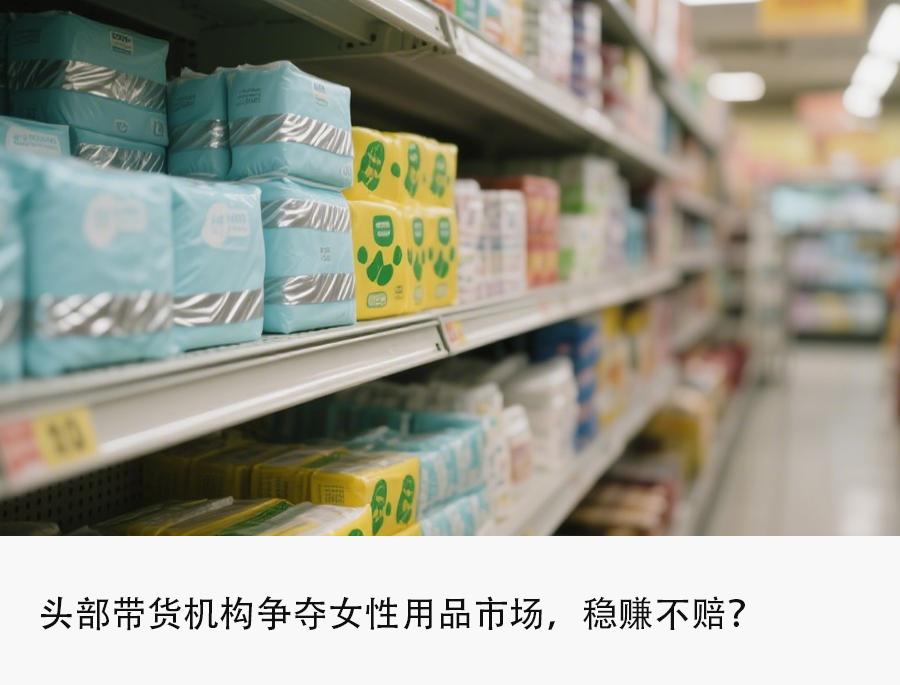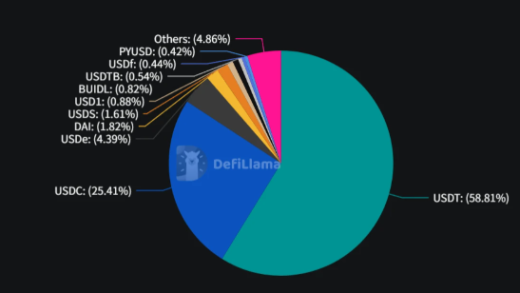
Read More《成本不到5毛,70%暴利,带货机构卖爆卫生巾》
Positive Reviews: Precise Entry into the Female Essential Market and New Opportunities for Industry Upgrade
In the current highly competitive consumer market, leading live – streaming e – commerce agencies have collectively targeted the sanitary napkin market. Essentially, this is a precise capture of the dual values of “female essential products + high gross profit margin”. Its positive significance is not only reflected in commercial success but also promotes the upgrading and standardization of the traditional consumer goods industry.
Firstly, the traffic advantage of live – streaming e – commerce and the strong stickiness of female users have activated the market potential of traditional sanitary napkin products. As a high – frequency essential product for women, sanitary napkins have a high user repurchase rate and stable demand. However, traditional channels (such as supermarkets and convenience stores) have long been monopolized by giants like Heng’an and Procter & Gamble, making it difficult for new brands to break through. Leading live – streaming agencies, with their large fan bases and strong trust relationships, have provided a “quick and efficient” cold – start path for their self – operated sanitary napkins. For example, the self – operated sanitary napkins of Dongfang Zhenxuan were sold out within 3 days of launch. Huang Zitao’s live – streaming room sold 800,000 orders and achieved sales of 40 million yuan in the first sale. Xinxuan’s “Mian Mima” exceeded 100 million yuan in a single live – streaming session. These data all confirm the strong conversion ability of “traffic + trust” for essential products in the live – streaming scenario. More importantly, live – streaming agencies package “daily consumables” into “scarce best – sellers” through pre – sales, limited – quantity offers and other strategies. This not only enhances user participation but also lays the foundation for subsequent repurchases. Once users form the habit of using the product after a rush purchase, the repurchase rate is often higher than that of traditional channels.
Secondly, consumers’ demand for “safety and quality” has forced product upgrades, and the entry of leading agencies has accelerated the transparency of industry standards. After the exposure of inferior sanitary napkins at the 3·15 Gala in 2024, the public’s sensitivity to product quality soared. Safety labels such as “formaldehyde – free, fluorescent agent – free, and weakly acidic” have become core selling points. Dongfang Zhenxuan emphasizes “100% pure cotton surface” and “suitable for sensitive skin”. Duowei claims to use “silk fiber fabric + medical – grade standards”. Xinxuan’s “Mian Mima” focuses on “self – developed core technology”. Although there is a marketing element in these promotions, they objectively promote the transformation of the industry from a “cost – oriented” to a “quality – oriented” model. In the past, some small and medium – sized brands used inferior fluff pulp or recycled materials to cut costs. However, leading agencies, relying on their bargaining power in the supply chain, choose to cooperate with high – quality contract manufacturers such as Tianjin Beishute. Some, like Duowei, even invest 275 million yuan to build their own transparent factories, which objectively improves the overall production standards of the industry.
Finally, the “cross – border” entry of leading agencies has injected new competitive variables into the traditional consumer goods industry and may break the monopoly pattern of giants. For a long time, brands such as Heng’an International (Seven Degrees Space) and Unicharm (SOFY) have dominated the market with their channel advantages. However, the self – operated brands of live – streaming agencies quickly capture users’ minds with “high cost – performance + strong trust endorsement”. For example, the membership price of Dongfang Zhenxuan’s sanitary napkins is 0.8 yuan per piece, and Duowei’s 62 – piece pack costs 49.8 yuan (0.8 yuan per piece). Although it is slightly higher than the low – price products of 0.4 – 0.5 yuan per piece on some e – commerce platforms, by emphasizing “safety + quality”, they have successfully opened up a new “mid – end quality” market between “low – price white – label products” and “high – price international brands”. This change in the competitive pattern not only gives consumers more choices but also forces traditional brands to accelerate product upgrades (such as launching fluorescent agent – free series), ultimately benefiting the entire industry.
Negative Reviews: Quality Concerns and Sustainability Challenges under the Halo of High Gross Profit
Although leading live – streaming agencies have shown a remarkable start in the sanitary napkin market, problems such as “high gross profit dependence”, “quality control risks in contract manufacturing”, and “questions about inflated value” hidden in their business models may become hidden dangers for long – term development.
Firstly, the quality control loopholes in the contract manufacturing model are eroding consumers’ trust. Currently, except for Duowei, which has partially built its own factories, Dongfang Zhenxuan and Xinxuan both adopt the OEM (Original Equipment Manufacturer) model. The advantage of OEM is its asset – light nature and low trial – and – error cost, but the drawback is that the brand has weak control over the production process. As reported in the news, Duowei was complained about “black foreign objects in sanitary napkins”, and Xinxuan’s “Mian Mima” was exposed for “excessive thiourea content”. Although the brands responded that these were “accidental problems in the production process” and “complied with national standards”, consumers’ doubts about “contract manufacturing = uncontrollable quality control” have not been eliminated. More importantly, sanitary napkins are sensitive products that come into direct contact with the human body, and any quality problem may trigger a “collapse” crisis. The incident of inferior sanitary napkins exposed at the 3·15 Gala in 2024 has already reduced consumers’ trust in the industry to rock – bottom. If leading agencies cannot establish strong control at the production end (such as dispatching quality control teams and making the production process public), it will be difficult to maintain long – term trust with just “endorsement by anchors”.
Secondly, the rationality of the price under the “high gross profit” label is questionable, which may lead to disputes about “fleece – cutting”. Industry data shows that the gross profit margin of mainstream sanitary napkins is generally between 55% and 70%, far exceeding the average level of fast – moving consumer goods. Take Dongfang Zhenxuan as an example. The selling price of its sanitary napkins is 0.8 – 1 yuan per piece, while the contract manufacturing cost is only 0.15 – 0.35 yuan (for mid – end products). Even when brand marketing, logistics and other costs are included, the gross profit margin may still exceed 60%. Although the brand emphasizes “using high – price raw materials such as 100% pure cotton and no fluorescent agents”, consumers’ doubts about “whether the cost matches the selling price” always exist. For example, the unit price of some well – known brands (such as Freedom Point and Always) on e – commerce platforms can also be as low as 0.4 – 0.5 yuan per piece, and they also claim to be “fluorescent agent – free”. Whether consumers will recognize the “quality premium” of leading live – streaming agencies still needs time to verify. If consumers find that “high price = marketing packaging” rather than “real quality difference” in the future, the brand’s reputation may quickly collapse.
Thirdly, the tightening of industry supervision and homogeneous competition will test the long – term competitiveness of agencies. The new mandatory national standard for sanitary products issued in June 2024 (effective on July 1st) clearly includes sanitary napkins in mandatory supervision and puts forward higher requirements for microbial indicators and harmful substance residues. This means that the asset – light model that relied on “contract manufacturing + marketing” in the past will face stricter compliance pressure. If the contract manufacturer cannot meet the new national standard, the brand may be forced to change its partner or increase quality control costs. In addition, as more live – streaming agencies (such as Jiaoge Pengyou and Xiaoyangge) follow suit and enter the market, the sanitary napkin market will soon enter a stage of homogeneous competition. Currently, Dongfang Zhenxuan has only launched 2 specifications, Duowei has 5, and Xinxuan’s “Mian Mima” has a more comprehensive coverage. However, the product differences mainly focus on “material promotion” (such as pure cotton and silk fiber), lacking real technological barriers (such as patented absorbent cores and special functional designs). If the industry falls into a “price war” or “marketing talk competition” in the future, the profit margins of leading agencies will be compressed, and brands without core technologies will lose their competitiveness.
Advice for Entrepreneurs: The Survival Rule of Shifting from Traffic – Driven to Product – Driven
The “boom” in the sanitary napkin market is essentially a combination of the traffic dividend and the upgrading of consumer demand. However, if entrepreneurs want to establish a long – term foothold in this field, they need to break free from the mindset of “traffic – driven sales” and shift to building comprehensive capabilities in “product power + trust power + compliance power”.
First, balance contract manufacturing and independent R & D to build core production capabilities. Although the contract manufacturing model is asset – light, it has high quality control risks. Entrepreneurs can choose “in – depth contract manufacturing” or “partial self – construction” according to their own resources. For example, they can sign an “exclusive production line” agreement with the contract manufacturer and dispatch a quality control team to supervise the whole process; or, like Duowei, jointly invest in building a transparent factory with the factory (the financial pressure needs to be evaluated). For small and medium – sized entrepreneurs, they can first focus on niche scenarios (such as sanitary napkins for sensitive skin or sports – type sanitary napkins) and form differentiation through customized raw materials (such as imported absorbent resin) to avoid direct competition with leading agencies.
Second, establish a transparent quality control system and use “data” instead of “slogans” to win consumers’ trust. In response to consumers’ concerns about quality, entrepreneurs should actively disclose key production information, such as the qualifications of raw material suppliers (whether traceable pure cotton or imported materials are used), third – party test reports (such as specific values of no formaldehyde and fluorescent agents), and production environment certifications (such as GMP workshops). For example, Dongfang Zhenxuan can disclose the test reports of its contract manufacturer (Tianjin Beishute), and Duowei can broadcast the production process of its transparent factory to eliminate users’ doubts through “visualization”.
Third, set a reasonable price and strengthen “value communication” to avoid disputes about “fleece – cutting”. Pricing should take into account costs, competition, and consumers’ perceived value. If the product is positioned as “quality upgrade”, users should be clearly informed of the specific advantages corresponding to the “high price” (such as 0.15 – yuan ordinary fluff pulp vs 0.3 – yuan imported absorbent resin). If it is positioned as “high cost – performance”, costs should be reduced through large – scale procurement (such as Xinxuan’s “Mian Mima” which lowers the contract manufacturing price through 8 – year – accumulated order volume). At the same time, excessive marketing should be avoided (for example, the claim of “medical – grade” should have clear certification basis), and real user feedback (such as test reports for sensitive skin) should be used to replace empty promotions.
Fourth, make early arrangements for compliance capabilities to cope with the upgrading of industry supervision. The new national standard implemented on July 1st, 2024, puts forward higher requirements for indicators such as microorganisms and harmful substances. Entrepreneurs need to confirm with the contract manufacturer whether the existing production line meets the standards, adjust raw material procurement in advance (such as replacing adhesives containing thiourea), and optimize the production process (such as strengthening workshop disinfection). In addition, they should pay attention to industry trends (such as the possible future introduction of a “mandatory standard for sanitary napkin size deviation”) and apply for relevant certifications in advance (such as ISO quality system certification), and include compliance costs in the early – stage budget.
In summary, the “sanitary napkin fever” of leading live – streaming agencies is not only a harvest of the traffic dividend in the consumer market but also an epitome of the upgrading of the traditional industry. For entrepreneurs, the opportunity in this field lies in “filling the gap in quality demand”, but the challenge lies in “how to build a moat with product power and trust power after the traffic dividend fades”. Only by breaking free from the mindset of “making quick money” and truly centering on user needs can they go further in this “essential but sensitive” market.





